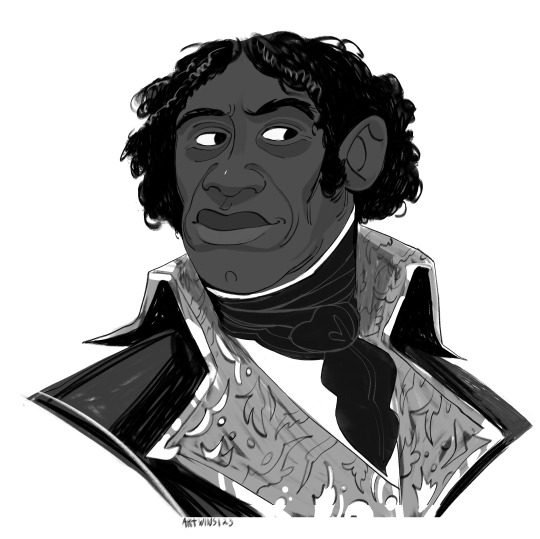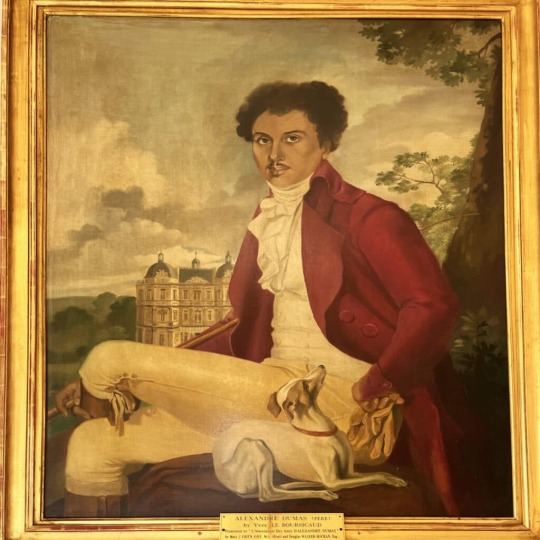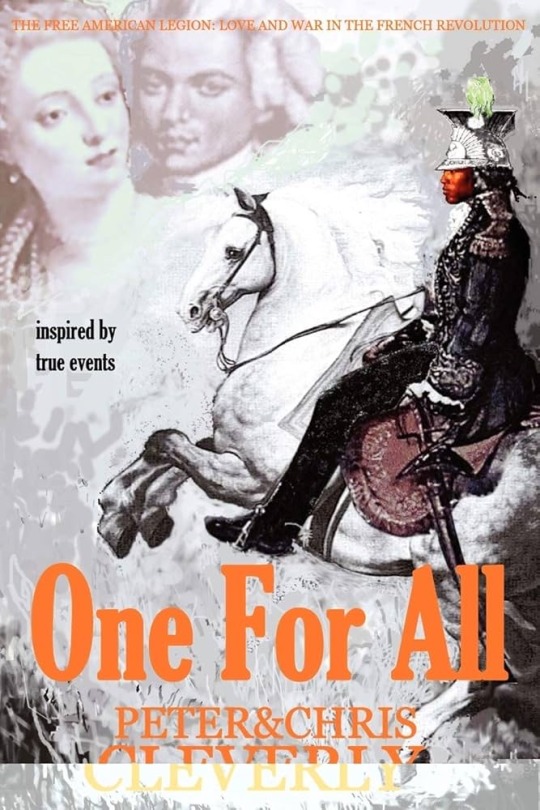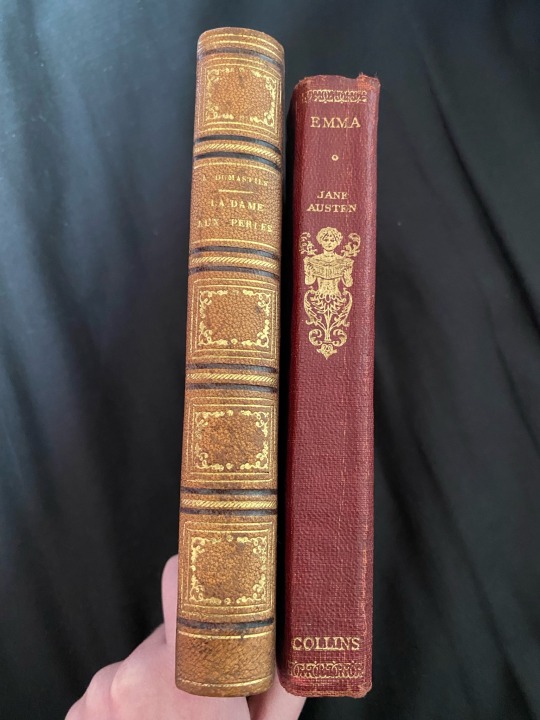#general dumas
Explore tagged Tumblr posts
Text
Hey, Citizens! The next review subject will be this book!

Yes, I keep looking for a good story featuring a POC protagonist, because these people absolutely deserve the spotlight. Let’s hope this book will not disappoint and that the two prominent black men of Frev mentioned in the synopsis will get a much needed good story told about them!
This review will be dedicated to @lanterne , @revolutionarywig , @saint-jussy , @michel-feuilly and @theorahsart .
21 notes
·
View notes
Text
Winner of the napoleonicsexyman tournament

After 10 years of this tournament, General Thomas-Alexandre Dumas beat Alexander von Humboldt to win the contest.
#napoleonicsexyman tournament winner!#General Dumas#people hated by Napoleon#if it had been Murat vs Dumas I don't know what I'd do
4 notes
·
View notes
Text

man, we haven’t drawn this iconic general for ages (and we forgot his beard & moustaches)
36 notes
·
View notes
Text


Alexandre and his dog (reupload)
#thomas alexandre dumas#general dumas#frev#french revolution#napoleonic wars#black history#history#art#love this portrait
53 notes
·
View notes
Text
Thomas Alexandre Dumas: The First Black French General - by Doug Daye
Did you know that the famous books, The Count of Monte Cristo and The Three Musketeers were based on a Black man? Writer Alexandre Dumas’ novels were inspired by the life of his father Thomas-Alexandre Dumas who was the highest-ranking Black leader in the French military and served under Napoleon Bonaparte. Villa Finale’s copy of The Count of Monte Cristo in the museum’s library. Dumas was born…

View On WordPress
#Black Authors#Black History#Count of Monte Cristo#France#General Dumas#Military History#Monuments#Napoleon Bonaparte#Thomas-Alexandre Duma
4 notes
·
View notes
Text
My Dadler and Graveson AU headcanons!
Adler was hassaled a lot at work (mostly by sev, case and marshall) on who was in the photo he had laminated and framed in a small terribly painted wooden frame. it had crossed his colleagues minds that it could be his kid but the thought that Russell Adler had a kid was baffling so they assumed it was a nephew or even a photo of himself as a kid.
2. Adler would take Phillip to a nearby DVD store anytime he could allowing Phillip to run down the isles finding the right movie and when they got to the front desk to rent the movies Phillip would pick from a large selection of bagged lollies that they then would take home bundle up on the living room couch and watch whatever movie Phillip had picked out.
3. Phillip had joined the Marines completely out of the blue and gave Adler no notice that he would be entering the military so when Adler was looking over the new marine corps recruits looking for foreign infiltrators he almost had a heart attack when he saw his sons face on one of the profiles, Adler also almost arrested Phillip because he thought someone was using a stolen identity because his son would never join the crayon munchers right? :)
4. When Adler wasn't able to look after Phillip over the school holidays he would drive Phillip to "uncle wood's house" the nickname frank had earned was by complete mistake when Phillip heard David call woods uncle and so phillip gave woods the moniker uncle woods and that title stuck. (Phillip still uses it when he talks to him over the phone 20 years later)
5. during the events of MW3 Adler was sitting in the living room of his estate watching TV when the Tv show his Phillip had convinced him to watch (its the great British bake off cause the shadows and Garves love the show and Phillip wanted to spread the love to his old man) was interrupted by a breaking news story that his son was in the center of after watching just a few moments of the court case he called up a few old friends who had a little 'chat' with a certain general, Adler was hoping to get a response from said general but alas he never received one.
:)
#phillip graves#russell adler#cod cold war#call of duty#sevati sev dumas#troy marshall#william case calderon#dadler and graveson#dadler#general shepherd
40 notes
·
View notes
Text
you’d have to be so silly to think dumas wasn’t trying to imply eugenie is a lesbian in the count of monte cristo lol. she’s only just properly been introduced where I’m at and she’s basically described in accordance with invert theory. this is how people understood these ��tendencies’ I’m p sure his audience would have known exactly what he was implying
#'her upbringing [...] like some traits of her physiognomy seemed more appropriate to the other sex'#'with something even firmer and more muscular in her beauty'#'you are the only woman I know who is so generous in speaking about others of your own sex'#like sorry but this was obvious code (and no doubt it'll get more unflattering in its depiction this is actually quite nice for now)#that would be understood by dumas's audience#like sorry I don't think they were coming away thinking she was just v pro-women lmao#moth.txt#what I'm reading
426 notes
·
View notes
Note
Can you explain more what you mean about Ridley Scott having old man gaze? I'm really curious lol
Back in the day... Ridley's day too, -Most mainstream big movies had that dynamic. Some leading white guy who was older than his love interest. This was that white male director's gaze. So it was standard. We didn't see it as fanfiction back then... But once it clicks into place.... The guy was a good 10 - 20 years older than his female love interest. Ridley Scott is 86 years old. 86. He is still directing the same kinds of movies with the same gaze as he did in the 80's. It's not about historical accuracy. It's about defending that gaze and that "tradition".
It's in the same realm of debate as "when will real cinema come back", a subject that is always brought up by or centered around old white male auteurs.
They act like it's about being tired of one subject dominating genre (IP and especially comic book films) but really, it's more about the increased inclusion, in both the players and the gaze steering the proceedings and audiences enjoying it. So, when Ridley is cussing about his disregard of accuracy, he's really being defensive of his gaze being so much less taken at face value, without basic interrogatives about it, these days. He's an old man yelling at a cloud. And having what used to be baseline normalcy in American film; instead inspiring knowing chuckles and eye-rolls, because of course, you cast the boring old standard of a too-old J. Phoenix and too-young V. Kirby, even when the reality (Jo was actually six years older than Napoleon) would have made that dynamic in your movie much more interesting... But upholding old cliches as "real cinema' regardless of the actual quality/watchability of the film matters more to him.
#I enjoy ridley scott's work#but he is an old white man#it does what it says on the tin#mans is stuck in the good ole days...for him and people who share certain physical features#he gets credit for alien#but remember that was written for a man#he also stretches the truth on those battles too.#I'm gonna guess he didn't include general dumas in this movie either lol#like I said 86 year old white man
65 notes
·
View notes
Text
[bolts upright in the shower] i need to reorganize my bookshelves
#my showerhead is really low so i am always slouching in there#anyway currently my fiction is kind of vaguely by genre. but this is nonsense. i should be organizing it by what it's doing for me#a) mainly blorbos. or maybe the worldbuilding is really cool or the plot is really absorbing. comfort reads.#b) it's less about the story than it is about the way in which the story is told (though it can also be about the story)#b would be austen; woolf; ishiguro; moby-dick; the name of the rose; if on a winter's night a traveler; their eyes were watching god#but also definitely imperial radch; broken earth trilogy; the raven tower; green bone saga. and poetry by definition#a would be six of crows; graceling realm; some childhood favorites; possibly the dispossessed but i would have to reread to confirm#also the goblin emperor! and maybe babel. maybe connecticut yankee in king arthur's court?? i would have to reread#twain (and dickens) in general would be difficult because they are so fun to read so definitely comfort reads. but also! that satire!#everything i never told you (which i just reread) would go in a. i suspect i claudius would as well but would have to reread#my two favorite short story writers might go in different places? ken liu is definitely b but ted chiang might be a#i don't currently own piranesi because i gave my copy to my sister to give to our impossible-to-shop-for sister for christmas#but reacquiring it is a priority. and when i have it where will it go? oh goodness. that's really hard#with tmbd it would just be which shelf has room for all of them. bc they are doing everything & fit in all categories#i think battle of the linguist mages (which is not even one of my favorite books but it's just so batshit that i have to respect#how batshit it is. and therefore can never get rid of it)#could go in either bc i do really like the worldbuilding but also the main thing it is doing for me is just being really wild#and uncategorizable. and reminding me of how fun it was to discuss it with my sister#books#my posts#i guess if i started mixing in the french books instead of keeping them on their own special shelf i'd be putting dumas in a#and maupassant in b. sartre and queneau in b. ionesco obviously b. the dictionary in b.#verne in a. hugo probably also in a though i respect the grind. really not sure where to put valérie perrin. or colette#this is making me realize i can get rid of some french books because i'm looking at them now and i wouldn't put them in either#because i didn't really get that much out of them. so why am i keeping them?#wow maybe this will help me get rid of more books...the real endgoal. if it's not sparking joy then it's outta here#i could take this further and do it for the nonfiction too. roget's and le robert de poche would definitely be in b
7 notes
·
View notes
Text
2025 TBR Challenge
Rules: post 9 books you'd like to read in 2025
So, I saw the post made by @girldante (sorry if I tagged you but your post inspired me to join the challenge...) and I decided to make this challenge just for the sake of making a first list of books I want to read this year (hoping I'll manage to read the same number of books I reached last year).
These are all books I bought towards the end of the year or found at home. The first three books are from authors I discovered last year. I read already something from Ortese and Rea but not from La Capria so, let's see how it will be.
Also, it's been years since I read something from Hugo, it's time to see if older me can appreciate him better now (last time I read something from him I was 18 and it was the first time ever too so...uhm, yeah, I think it's time to re-evaluate him).
Don't mind about Pasolini and Calvino being placed like that haha. I'm planning to read almost everything they wrote and I want to read at least ONE book from them each year (that or switching to Levi and Buzzati once I'm not able to read something from them).
Please imagine there's a tenth spot dedicated to the last two books of The Mirror Visitor. I'm planning to read them too this year but I would have cheated by putting both of them here 😅









Tagging @rlvaille @jongside and @zaegreus (no pressure ofc!)
#I know what are you asking: Teresa why did you choose Quatrevingt-treize from Hugo?#the answer is simple: I'm scared to pick up Les Misérables and I don't want to re-read Notre-Dame de Paris and ending up disliking it#writing style wise btw#I loved the story of Notre-Dame but I remember how much painful was going through the descriptions#sadly despite having my father who's a certified fan I don't have anything from Dumas (father and son btw)#but I want to read something from them#in general I guess I'll read at least one French author each year for a while#FLAUBERT YOU'RE ON THE LIST TOOOOOO#la maggioranza di autori italiani qua dentro è per colpa di Ilenia Zodiaco e la sua brillante idea di iniziare i mattoni italiani#io quando vedevo il video ero tipo: ah e me lo dici adesso che ho già la mia lista personale?!#sì quel video mi ha fatto ricordare che ho una fracca di libri da leggere per quanto riguarda il 900 italiano#avrò l'ossessione per un po'#tag games
8 notes
·
View notes
Text
JACOBIN FICTION CONVENTION MEETING 39: ONE FOR ALL (2007)

1. The Introduction
Hello, Citizens! I’m back at it again, reviewing Frev media! Hope you’re happy to see me again in action!
Anyway, today we have an obscure book. A book I found by accident while looking for any media featuring people of color during Frev — which is an overlooked angle in my opinion.
I found this book on Goodreads and, unfortunately, it can only be purchased through Amazon so far… so I had to make an order and wait for the shipping to arrive. Let’s see if the money and the waiting were worth it though!
This review is dedicated to @saint-jussy , @revolutionarywig , @michel-feuilly , @theorahsart and @lanterne .
2. The Summary
I had to “borrow” the summary from the Amazon page, because it includes some… INTERESTING details:
"In the bloody chaos of the French Revolution an exceptional man comes of age: Alexandre -romantic, intelligent, immensely strong, son of a slave-owning Count and his Haitian first wife.
He accidentally discovers the guilty secret of his new stepmother and her vicious brother. They conspire to destroy him. Cast out by his father, Alexandre is befriended by Chevalier de Saint-George - France's greatest swordsman, Marie-Antoinette’s lover - and falls in love with hot-tempered Marie Labouret.
When Saint-George is wounded helping the Royal Family escape, Alexandre leads the Free American Legion - 1,000 Black lancers - in a brave defence of the Republic against the invading Royalist armies. In ONE FOR ALL the most extraordinary people and amazing events are actual historical fact. Alexandre's son, world-renowned author Alexandre Dumas, found inspiration in the adventures of his father and his father's friend - the Black originals of the much loved characters Porthos and D'Artagnan in THE THREE MUSKETEERS."
I already see a few questionable choices done by the author, but let’s not judge the book too harshly just yet and proceed with the review! I do, personally, love a good swashbuckling story, so it might be a good piece of fiction despite the inaccuracies.
Just put a pin on the “inspired by true events” tidbit included on the cover. You’re going to need to remember this.
3. The Story
I do think that the book has a good prologue, showing Alexandre’s carefree childhood with his parents, where he is a typical child who pulls pranks and doesn’t want to adhere to rules yet. It does a good job of setting up the backstory of the character.
The story proper, I feel, is also doing a good job introducing the characters, especially the stepmother and the step uncle (more on them later). The pacing is also quite good, for the most part, although I really wasn’t that able to turn off my brain and ignore the numerous historical liberties taken by the authors.
Perhaps it would have been better to just make a book about fictional characters instead of the historical ones, but hey. We have what we have.
Also, I didn’t like the fact that the main two villains of the story sometimes lack motivation to do all the shit they pull in the book. As if they are Disney villains whose only trait is “evil”.
For example, the stepmother wants Alexandre cast out so his father doesn’t have him as heir. Pretty standard plotting for an “evil stepmother” type of character, but I occasionally got the feeling that she was only doing it for the evils, even when Alexandre’s father dies and she still attempts to murder her stepson, even though now she has the inheritance she wanted and technically doesn’t need to bother herself with Alexandre’s existence anymore.
But I guess villains just can’t chill out, can they?
Mostly, however, the adventures were quite interesting to follow and I did finish the book in one sitting.
4. The Characters
I do like Alexandre, although at times he seems a bit too idealized in the book. He is kind, brave and chivalrous, just trying to achieve justice and take back the inheritance that is rightfully his.
His stepmother, referred to as “the Countess” in the book, is a standard issue evil stepmother, similar to Madame de Villefort from “The Count of Monte Cristo”. Honestly, the authors do a pretty good job of portraying a vile aristo snake that you just want to see destroyed.
Her brother, de Malpas, is just as evil, and is even incestuous with his sister. As if those two weren’t gross enough. He also murders people left and right for fun, so there’s that.
Chevalier de Saint-George is a character I also liked. He is kind of like a mentor and a brother to Alexandre, and they have a sweet friendship going on!
Marie Labouret is an independent and fierce young woman, but she didn’t seem too modern for the most part.
I couldn’t care less for Alexandre’s father, though. Or rather sperm donor. When the Countess accused her stepson of unspeakable things, this ass immediately through Alexandre out and didn’t even bother to investigate the issue even AFTER the fact. Father of the Year, everybody!!!
5. The Setting
As I mentioned, there are inaccuracies and creative liberties. MANY OF THOSE. That being said, I was pleasantly surprised that the setting wasn’t too bad when it comes to portraying Frev.
There are mentions of mobs killing nobles, as usual, but it’s only mentioned by one character and so we don’t know if it’s true or not.
Also, both Alexandre and Saint-George are still republicans, despite the latter having romantic feelings for the Queen. So the authors at the very least are SOMEWHAT familiar with nuance.
6. The Writing
Sometimes the descriptions are lacking and sometimes the linguistic choices felt a bit too modern to me, but otherwise the writing was quite fine.
7. The Conclusion
All in all, this book is a hit in some ways and a miss in others. I don’t know why the authors twisted history so much when they could have made up their own characters, but the book was still a pretty enjoyable adventure and an interesting experiment.
Read at your own discretion, if you want, but I wouldn’t say I highly recommend it to everyone.
On this note, I declare the Jacobin Fiction Convention closed for now. Stay tuned for future updates!
Love,
Citizen Green Pixel
#general dumas#jacobin fiction convention#one for all#thomas alexandre dumas#joseph bologne#chevalier de saint george
15 notes
·
View notes
Text
"I think I am superior to him"
General Mathieu Dumas' visit to General Moreau


Memoirs Of His Own Time By Mathieu Dumas V2: Including The Revolution, The Empire, And The Restoration, 1839
archive.org
25 notes
·
View notes
Note
BOOO!!!
- @general-alex-dumas
SACREBLEU ITS A GHOST FROM 23 DAYS AGO!!!!
MAYBE ITS GONE AWAY SINCE THE LETTER PILE IS FUCKING HUGE NOW
BAD JOKES ASIDE bonjour generale! where the hell did you come from?!
6 notes
·
View notes
Note
Hello, Lasalle!
- @general-alex-dumas
By God, that is a name I haven't seen in a long time! How have you been, my friend?
4 notes
·
View notes
Note
Well, well, well, David! Good day!
- @general-alex-dumas
My my, what a wonderful surprise! If it isn't the legend of Porthos himself!!
Oh, good day, general Dumas. It's a pleasure to meet you.
It's seems that my partner has been reading too much lately... Heh.
Well, I believe that, throught a delightful book, I can find the perfect inspiration for my works!
3 notes
·
View notes
Text




I got really lucky at a charity shop today and I wanted to show!! I got a first edition French copy of La Dame Aux Perles by Alexandre Dumas (same guy who wrote the OG The Three Musketeers and The Count of Monte Cristo!) and an 1951 copy of Jane Austen's Emma!
I love Alexandre Dumas' works to death, especially The Count of Monte Cristo and La Dame Aux Camelias, so I was really surprised to find such an old edition, let alone in French, for only five quid. Let alone the old copy of Emma.
Are they musty? Yes. Is the cover coming off the spine? Yes. But is it cool to think I'm holding a book that has passed by hundreds of hands, sat on hundreds of bookshelves, and has survived two world wars?? Big yes!!
#I'm a massive old book collector so I got super excited when I saw these two#normally old hardcovers (especially any of Alexandre Dumas' works) go for 25-40 in the least so this was an absolute steal#I'd bring it into school to read but I'm very afraid to break it#but at the same time I'm thinking if it survived two world wars it can survive in my school bag y'know#also Emma had a name and a school signed on the front page!#it says it was given as a 'class prize for general good work' and awarded to a girl#I'm not putting the name up because it's a full name and I'm just a bit weary about it#anywho#quite happy :D#mel's thoughts#mel's photos#alexandre dumas#la dame aux perles#jane austen#emma (Jane Austen)
12 notes
·
View notes